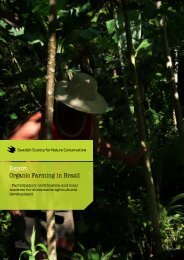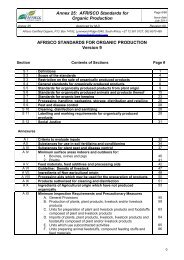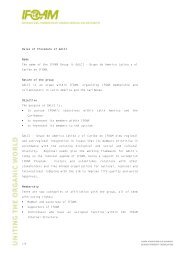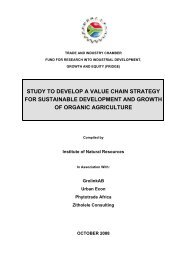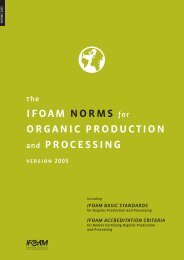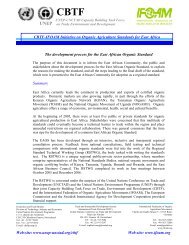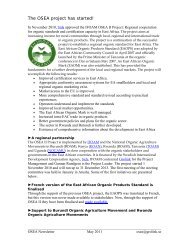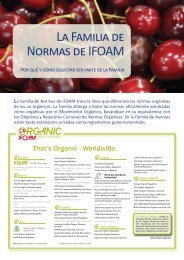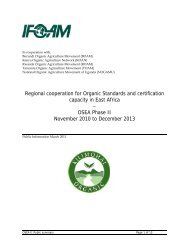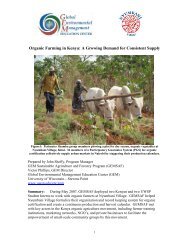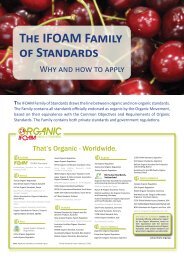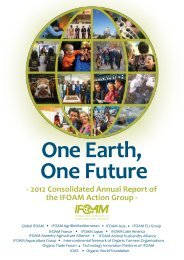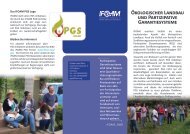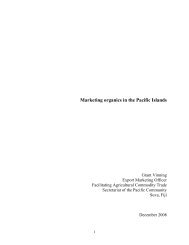OSEA I Project Report - ifoam
OSEA I Project Report - ifoam
OSEA I Project Report - ifoam
You also want an ePaper? Increase the reach of your titles
YUMPU automatically turns print PDFs into web optimized ePapers that Google loves.
DEVELOPMENT OF A REGIONAL ORGANIC AGRICULTURE STANDARD IN EAST AFRICA 2005-2007<br />
The East African market for organic products is relatively small but fast-growing. Some supermarkets<br />
and green groceries are stocking organic products. There are a few dedicated organic<br />
shops and direct marketing schemes (box schemes and farmers’ markets) and sales to restaurants,<br />
hotels, wholesalers and retailers. Most of the initiatives to develop local/national markets are<br />
NGO-supported growers’ groups, private companies and businesses, cooperatives, and organized<br />
producer groups. Sales are mainly fresh produce. Among the processed products are honey, teas,<br />
jams, milk products, dried fruits, mushrooms and oils. Self-claim is the normal form for assurance<br />
about the organic quality, but PGS systems and third-party certification also exist.<br />
Certification<br />
There are two organic-certification bodies in Kenya: AfriCert and EnCert. UgoCert is based in<br />
Uganda and TanCert in Tanzania. EnCert has a clear focus on certification for the domestic<br />
market, while AfriCert is ISO 65 accredited for EurepGap. TanCert and UgoCert are both in the<br />
process of accreditation to ISO 65 and the IFOAM norms. TanCert has agreements with IMO<br />
and bio.inspecta and UgoCert with IMO and Ceres. Both have been supported by the EPOPA<br />
programme, but support is now phasing out and will cease in mid 2008. Certification is also<br />
offered by Europe-based certification bodies such as IMO, Ceres, EcoCert, BCS, Soil Association<br />
and bio.inspecta.<br />
Apart from third-party certification, the national organic agriculture movements, often in cooperation<br />
with NGOs, are implementing guarantee schemes for smallholders along the lines of<br />
participatory guarantee systems (PGS).<br />
STATUS OF ORGANIC STANDARDS AND<br />
CERTIFICATION IN EAST AFRICA 2005<br />
Uganda and Tanzania had already developed private-sector national standards for organic in a<br />
nationwide and participatory process. In Kenya, the Kenya Organic Agriculture Network had<br />
taken up standards development. The Kenya Bureau of Standards had also got engaged and<br />
produced a draft organic standard. In Tanzania the Bureau of Standards had set up a technical<br />
committee. In both Uganda and Tanzania, the Bureau of Standards participated in the initiatives<br />
of the private sector.<br />
Within the Sida 1 funded EPOPA 2 programme, cooperation between organic bodies in Uganda,<br />
Kenya and Tanzania had emerged. The activities were<br />
– a big seminar in Arusha December 2003<br />
– several joint inspection training sessions<br />
– three regional meetings of a working group consisting of two reps from each country<br />
– assistance in the standard development phase<br />
– joint training in certification procedures of certification managers and other staff<br />
On the basis of the background above, IFOAM and the national organic-agriculture movements<br />
(NOAMs) of Kenya (KOAN), Tanzania (TOAM) and Uganda (NOGAMU) agreed to propose<br />
a regional development programme for organic standards and certification cooperation: the<br />
1 Swedish International Development Cooperation Agency<br />
2 Export Promotion of Organic Products from Africa<br />
9



